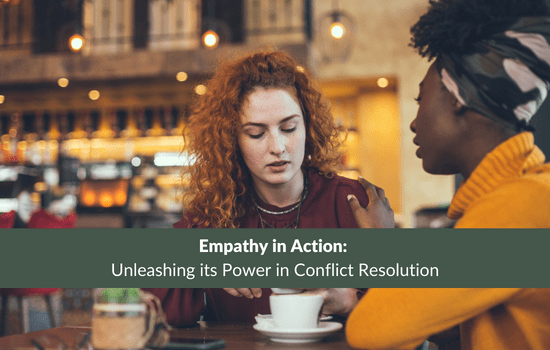Empathy is crucial in conflict resolution and vital to emotional intelligence. How we handle conflict affects our relationships and overall success.
Empathy's Role in Conflict: A Pathway to Resolution and Understanding

True empathy requires that you step outside your own emotion to view things entirely from the other person's perspective. - Linda Marshall, Author of The Power of Emotion
The Power of Empathy in Managing Conflict
Empathy plays a crucial role in managing conflict effectively. Here's how empathy helps in conflict resolution:
- Understanding perspectives: Empathy allows us to step into the shoes of others and understand their views, experiences, and emotions. When conflicts arise, empathizing with the other person helps us understand their perspective, motivations, and underlying needs. This understanding promotes open-mindedness and can lead to more productive and compassionate problem-solving.
- Active listening: Empathy involves active listening, where we pay attention to not only the words but also the emotions, non-verbal cues, and underlying messages of others. When managing conflict, empathetic listening helps us truly hear and validate the other person's feelings and concerns, fostering trust, respect, and understanding.
- Building rapport: Empathy creates a sense of connection and camaraderie between individuals. By acknowledging and empathizing with the emotions of others, we demonstrate that we genuinely care and understand their experiences, which can diffuse tension, create a safe space for open communication, and lay the foundation for finding common ground.
- Emotion regulation: Empathy enables us to regulate our emotions and respond more constructively during conflicts. By understanding and empathizing with the feelings of others, we can choose to respond with patience, compassion, and self-control rather than reacting impulsively or aggressively. This behaviour promotes a more positive and productive conflict resolution process.
- Collaborative problem-solving: Empathy helps create an atmosphere of collaboration and cooperation. By understanding each other's perspectives and emotions, individuals can work together to find mutually beneficial solutions. Empathetic individuals are more likely to seek win-win outcomes where both participants' needs are considered, leading to more sustainable resolutions.
Enhancing Our Emotional Intelligence
Typically as we strengthen our self-awareness, we develop empathic skills and enhance our emotional intelligence. Empathy is the foundation of emotional intelligence; you can improve it and manage conflict more effectively with practice. You can learn more here.
We’re Not All Born to be Empathetic
When working with teams or individuals struggling to manage conflict in their professional or personal lives, I recommend they practise empathy. Not everyone is born with the innate ability to be empathetic. Some have to work diligently to develop constructive relationships with others. The good news is anyone can learn empathy.Author Bruna Martinuzzi shares his tips for increasing empathy in his book, “The Leader as a Mensch: Become the Kind of Person Others Want to Follow." I have used Martinuzzi’s recommendations and agree they work well.
Martinuzzi’s Tips for Increasing Empathy
- Listen – truly listen to people.
- Don't interrupt people.
- Tune in to non-verbal communication.
- Practice the "93 percent rule".
- Use people's names.
- Be fully present when you are with people.
- Smile at people.
- Encourage people, particularly the quiet ones, when they speak up in meetings.
- Give genuine recognition and praise.
- Take a personal interest in people.
Stop and Respectfully Listen
When it comes to using empathy to manage conflict, try this, stop, and respectfully listen to others' feelings. Then, attempt to put yourself in their shoes. Only when we do this can we relate to what the other person is feeling, especially if we have never experienced a similar situation.
Practising Martinuzzi's tips will strengthen your empathy skills and, most certainly, enhance your relationships with others. You will also gather more practical strategies by reading this book, The Power of Emotion.
In summary, empathy in conflict management enhances understanding, active listening, rapport building, emotion regulation, and collaborative problem-solving. By embracing empathy, individuals can navigate conflicts with greater compassion, respect, and the potential to reach resolutions satisfying all parties involved. If you want to learn more about emotional intelligence, check this out and take an EQ-i 2.0 Assessment. Be sure to review many more motivational blogs here.
This article was originally published on January 20, 2018, and has been updated (June 2023).
More Motivational Reads Here »
Are you Emotionally Intelligent?
Sign up for Linda’s monthly tips to build your Emotional Intelligence and reduce Emotional Hijacking!

















